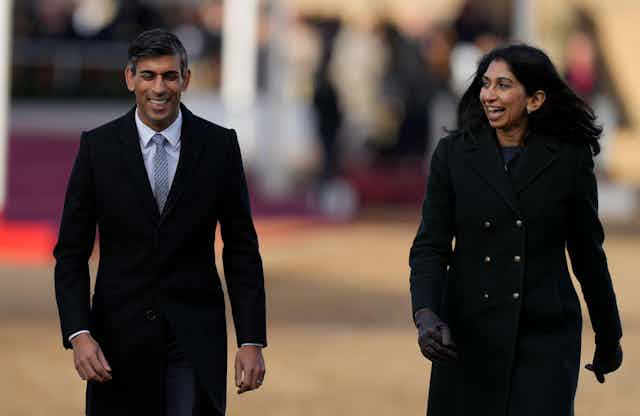There’s no question that British politics is becoming more diverse. From only four minority ethnic MPs elected in 1987, now 67 MPs are from a minority ethnic background.
The Scottish first minister, Humza Yousaf, recently became the first minority ethnic leader of a devolved government and the first Muslim to lead a major UK party. Yousaf follows a number of historic firsts: a Muslim mayor of London (Sadiq Khan), the first British Asian UK prime minister (Rishi Sunak), and the first female minority ethnic home secretary (Priti Patel) succeeded by another minority ethnic woman, (Suella Braverman).
People often assume that if a person in power is an ethnic minority, they will advocate more strongly for minority ethnic communities. But, as our research shows, ethnic diversity in government is not a guarantee of racial justice.
Some minority ethnic politicians align themselves with a “model minority” archetype, attributing their success to quintessentially British, conservative values of hard work and entrepreneurship. This was an oft-repeated message in the 2022 Conservative leadership campaign, the most racially diverse in history.
Read more: It matters that Rishi Sunak has become the UK’s first prime minister of Indian descent
Minority ethnic politicians’ presence in the senior echelons of UK politics is a symbol of diversity and social progressiveness. This, ironically, allows these government ministers to justify policies that are cruel to immigrants, and ignore legitimate concerns of minority ethnic citizens.
Badenoch has rebuffed calls for more teaching of black history in schools. A 2020 report from the race equality thinktank the Runnymede Trust said that more diversity in what children are taught is key to addressing the racism that is “deeply embedded” in Britain’s schools.
Speaking about perpetrators of child sexual exploitation, Braverman claimed grooming gangs are “almost all British Pakistani men”. This was despite the government’s own evidence to the contrary. She was flanked by Sunak suggesting that “political correctness” and “cultural sensitivities” were getting in the way of stamping grooming gangs out.
As home secretary, Priti Patel criticised Black Lives Matter protesters in 2020, and described England’s footballers taking the knee – a widely-supported symbol of anti-racist activism – as “gesture politics”.
Patel has implied that as a victim of racism herself, she – and the government – understand racial inequality. Her sidelining of others’ very real experiences of racism is seemingly permissible, given Patel’s minority ethnic identity.
Anti-immigration sentiment
There are also examples of minority ethnic ministers pushing policies that actively stigmatise and target vulnerable minority groups.
The illegal migration bill is the latest example of this. As post-racial gatekeepers, politicians like Braverman give legitimacy to hard-right views on race and immigration. At the same time, they prop up the line that immigration is no longer about race.
At the Conservative Conference in 2022, Braverman said, “It’s not racist for anyone, ethnic minority or otherwise, to want to control our borders.” And yet she has likened refugee flows to an “invasion” and said that immigration threatens the UK’s “national character”.

Notably, the government’s immigration policies of recent years are being formulated and championed by politicians who are themselves the children or grandchildren of immigrants. Sunak’s grandparents were among the Hindu and Sikh refugees who fled Punjab following the partition of India. Patel admitted that her own parents would not have been allowed into the UK under her immigration laws.
The illegal migration bill comes just a year after Patel led the passage of the Nationality and Borders Act. Both policies are designed to keep out outsiders, many of whom are black or brown. It is contradictory that the ministers responsible for these policies are descendants of immigrants themselves.
Read more: Illegal immigration bill does more than 'push the boundaries' of international law
Immigration is still about race
Despite comments like Braverman’s, evidence shows that immigration is still very much linked to race and racism.
Many minority ethnic people – even those who are British-born or naturalised citizens – feel they are still targets of the immigration debate. Ethnic minorities are the worst affected by stringent immigration policies and stigmatised by anti-immigration language.
Perceptions of migrants in relation to worth and value continue to be influenced by class and race. The current system, which depends on a hierarchy of immigrants by “skill”, means mostly white, university-educated and English-speaking migrants are consistently viewed more favourably than black, Asian and Muslim migrants.
And public opinion is far warmer towards Ukrainian refugees compared with those also fleeing war in Afghanistan, Syria, Sudan and Somalia.
Minority ethnic voters also perceived racial undertones in the anti-immigrant language used by the Leave campaign during Brexit. But while most voted Remain, some minority ethnic Brexit voters supported Leave in opposition to immigration from eastern Europe.
As with minority ethnic politicians calling for harsh border policies, immigrant status or family history is no guarantee of liberal attitudes to immigration or asylum.
Of course, this analysis does not apply to every minority ethnic politician. It is heartening to see other Conservatives speaking out about the inflammatory anti-migrant climate. Mohammed Amin, a former chair of the Conservative Muslim Forum, described Braverman’s rhetoric as “disgusting”.
But it is important to remember that ethnic diversity is not racial justice, nor can it protect the government from challenges to its harmful policies. As Baroness Sayeeda Warsi noted: “Braverman’s own ethnic origin has shielded her from criticism for too long.”

